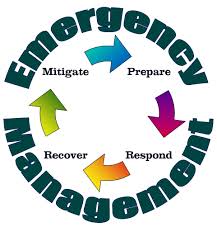Emergency management is the formation of plans through which communities decrease vulnerability to hazards and disasters. Emergency management does not avert or remove the threats; instead it focuses on creating plans to reduce the shock of disasters. Failure to generate a plan could lead to damage to property, human mortality and lost profits. Events covered by disaster management contain acts of terrorism, business sabotage, fire, public confusion, business accidents, and communication failures. Emergency management requires appraisal of: Mitigate, Recover from incidents, Emergencies, Disasters etc.
Emergency Management
















